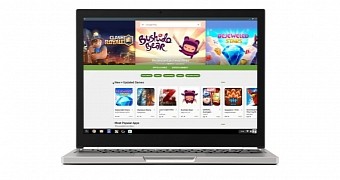Google has officially announced today that, starting June, future Chrome OS versions will come with support for the company's Google Play Store, with full support to be added later in the fall.
The news leaked in mid-April,when a Chromebook user spotted a work-in-progress option in the Chrome OS settings panel that allowed users to "enable Android apps to run on [their] Chromebook."
Google has just made it official today at its I/O 2016 developer conference, held in Mountain View.
Only a few devices will receive Play store support in the beginning
"Google Play will start rolling out in the developer channel with M53 on the ASUS Chromebook Flip, the Acer Chromebook R 11 and the latest Chromebook Pixel," Google Chrome OS engineers have announced today. "Over time, this will roll out to other Chromebooks in the market too."
Once this happens, users will see a popup on their screen, asking them if they want to benefit from accessing the Play Store and installing Android apps on their Chromebook.
Users won't have to do anything except clicking "Accept." There will be no custom software to install and no hardware upgrades needed. Apps will work for Chromebooks devices that have touch support at first, but non-touch devices will also receive it later in the year, probably in the fall.
Chromebooks are very popular
Data compiled by Future Source Consulting last year revealed that Chromebooks are wildly popular in the educational sector, especially in the US. Furthermore, Google has also shown that Chromebooks topped Macs in overall shipments and became the second most popular PC operating system in the US.
This is because Chromebooks devices are cheap, being restricted to running only Chrome OS, which is basically a bloated browser. The ability to run a stripped-down OS helps performance, but it also makes the devices ideal for tethered environments, such as schools, healthcare, businesses, government agencies, etc..
Google gave system administrators reassurances that they'll remain in control of their networks, and they can block Google Play Store integration for devices used in work-only environments, or at least use a whitelist to allow the installation of "productivity" apps only.
This announcement is a far cry from what the Wall Street Journal was announcing last October, when rumors surfaced about Chrome OS and Android merging. The two projects did merge, but Chrome OS wasn't killed off, as initially thought.

 14 DAY TRIAL //
14 DAY TRIAL //